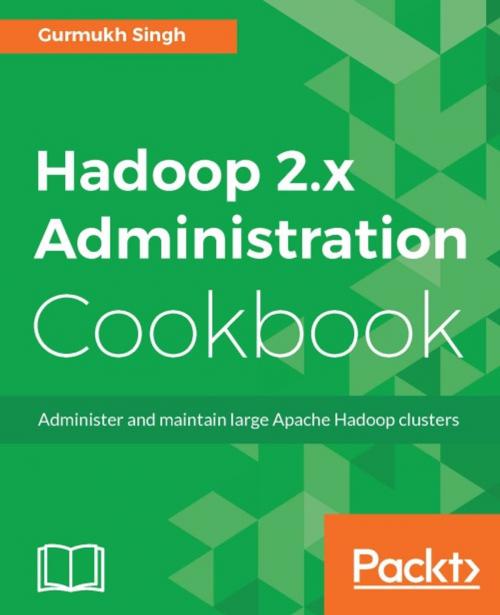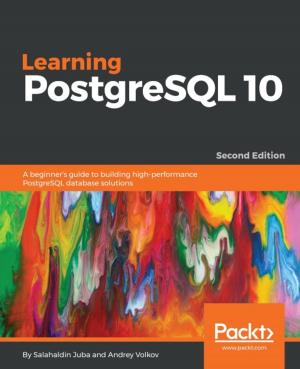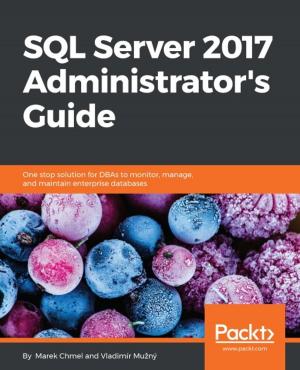| Author: | Gurmukh Singh | ISBN: | 9781787126879 |
| Publisher: | Packt Publishing | Publication: | May 26, 2017 |
| Imprint: | Packt Publishing | Language: | English |
| Author: | Gurmukh Singh |
| ISBN: | 9781787126879 |
| Publisher: | Packt Publishing |
| Publication: | May 26, 2017 |
| Imprint: | Packt Publishing |
| Language: | English |
Over 100 practical recipes to help you become an expert Hadoop administrator
About This Book
- Become an expert Hadoop administrator and perform tasks to optimize your Hadoop Cluster
- Import and export data into Hive and use Oozie to manage workflow.
- Practical recipes will help you plan and secure your Hadoop cluster, and make it highly available
Who This Book Is For
If you are a system administrator with a basic understanding of Hadoop and you want to get into Hadoop administration, this book is for you. It's also ideal if you are a Hadoop administrator who wants a quick reference guide to all the Hadoop administration-related tasks and solutions to commonly occurring problems
What You Will Learn
- Set up the Hadoop architecture to run a Hadoop cluster smoothly
- Maintain a Hadoop cluster on HDFS, YARN, and MapReduce
- Understand high availability with Zookeeper and Journal Node
- Configure Flume for data ingestion and Oozie to run various workflows
- Tune the Hadoop cluster for optimal performance
- Schedule jobs on a Hadoop cluster using the Fair and Capacity scheduler
- Secure your cluster and troubleshoot it for various common pain points
In Detail
Hadoop enables the distributed storage and processing of large datasets across clusters of computers. Learning how to administer Hadoop is crucial to exploit its unique features. With this book, you will be able to overcome common problems encountered in Hadoop administration.
The book begins with laying the foundation by showing you the steps needed to set up a Hadoop cluster and its various nodes. You will get a better understanding of how to maintain Hadoop cluster, especially on the HDFS layer and using YARN and MapReduce. Further on, you will explore durability and high availability of a Hadoop cluster.
You'll get a better understanding of the schedulers in Hadoop and how to configure and use them for your tasks. You will also get hands-on experience with the backup and recovery options and the performance tuning aspects of Hadoop. Finally, you will get a better understanding of troubleshooting, diagnostics, and best practices in Hadoop administration.
By the end of this book, you will have a proper understanding of working with Hadoop clusters and will also be able to secure, encrypt it, and configure auditing for your Hadoop clusters.
Style and approach
This book contains short recipes that will help you run a Hadoop cluster efficiently. The recipes are solutions to real-life problems that administrators encounter while working with a Hadoop cluster
Over 100 practical recipes to help you become an expert Hadoop administrator
About This Book
- Become an expert Hadoop administrator and perform tasks to optimize your Hadoop Cluster
- Import and export data into Hive and use Oozie to manage workflow.
- Practical recipes will help you plan and secure your Hadoop cluster, and make it highly available
Who This Book Is For
If you are a system administrator with a basic understanding of Hadoop and you want to get into Hadoop administration, this book is for you. It's also ideal if you are a Hadoop administrator who wants a quick reference guide to all the Hadoop administration-related tasks and solutions to commonly occurring problems
What You Will Learn
- Set up the Hadoop architecture to run a Hadoop cluster smoothly
- Maintain a Hadoop cluster on HDFS, YARN, and MapReduce
- Understand high availability with Zookeeper and Journal Node
- Configure Flume for data ingestion and Oozie to run various workflows
- Tune the Hadoop cluster for optimal performance
- Schedule jobs on a Hadoop cluster using the Fair and Capacity scheduler
- Secure your cluster and troubleshoot it for various common pain points
In Detail
Hadoop enables the distributed storage and processing of large datasets across clusters of computers. Learning how to administer Hadoop is crucial to exploit its unique features. With this book, you will be able to overcome common problems encountered in Hadoop administration.
The book begins with laying the foundation by showing you the steps needed to set up a Hadoop cluster and its various nodes. You will get a better understanding of how to maintain Hadoop cluster, especially on the HDFS layer and using YARN and MapReduce. Further on, you will explore durability and high availability of a Hadoop cluster.
You'll get a better understanding of the schedulers in Hadoop and how to configure and use them for your tasks. You will also get hands-on experience with the backup and recovery options and the performance tuning aspects of Hadoop. Finally, you will get a better understanding of troubleshooting, diagnostics, and best practices in Hadoop administration.
By the end of this book, you will have a proper understanding of working with Hadoop clusters and will also be able to secure, encrypt it, and configure auditing for your Hadoop clusters.
Style and approach
This book contains short recipes that will help you run a Hadoop cluster efficiently. The recipes are solutions to real-life problems that administrators encounter while working with a Hadoop cluster















